Professional Roles and Values: Ethical Principles in Nursing Report
VerifiedAdded on 2023/06/07
|6
|1479
|361
Report
AI Summary
This report examines the application of professional roles, values, and ethical principles in nursing, using a case study of Mr. Newcomb. It explores the principles of beneficence, non-maleficence, autonomy, and justice, and how they guide healthcare professionals in their interactions with patients. The report discusses how a strong therapeutic relationship can be established, and how to handle difficult situations. Furthermore, it outlines strategies for patients to promote self-care, including healthy eating, physical activities, and cultivating hobbies. The conclusion emphasizes the importance of ethical practice and patient-centered care.
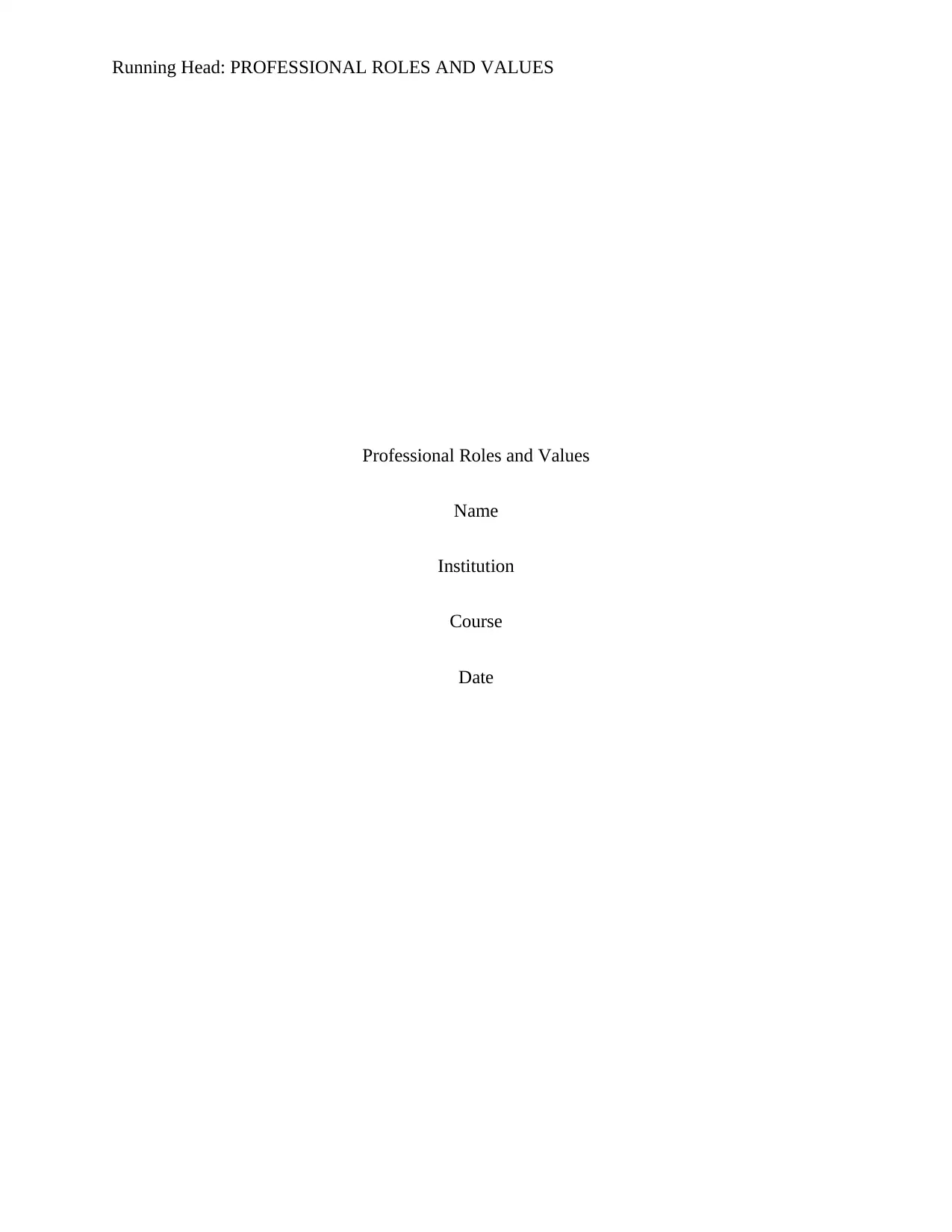
Running Head: PROFESSIONAL ROLES AND VALUES
Professional Roles and Values
Name
Institution
Course
Date
Professional Roles and Values
Name
Institution
Course
Date
Paraphrase This Document
Need a fresh take? Get an instant paraphrase of this document with our AI Paraphraser
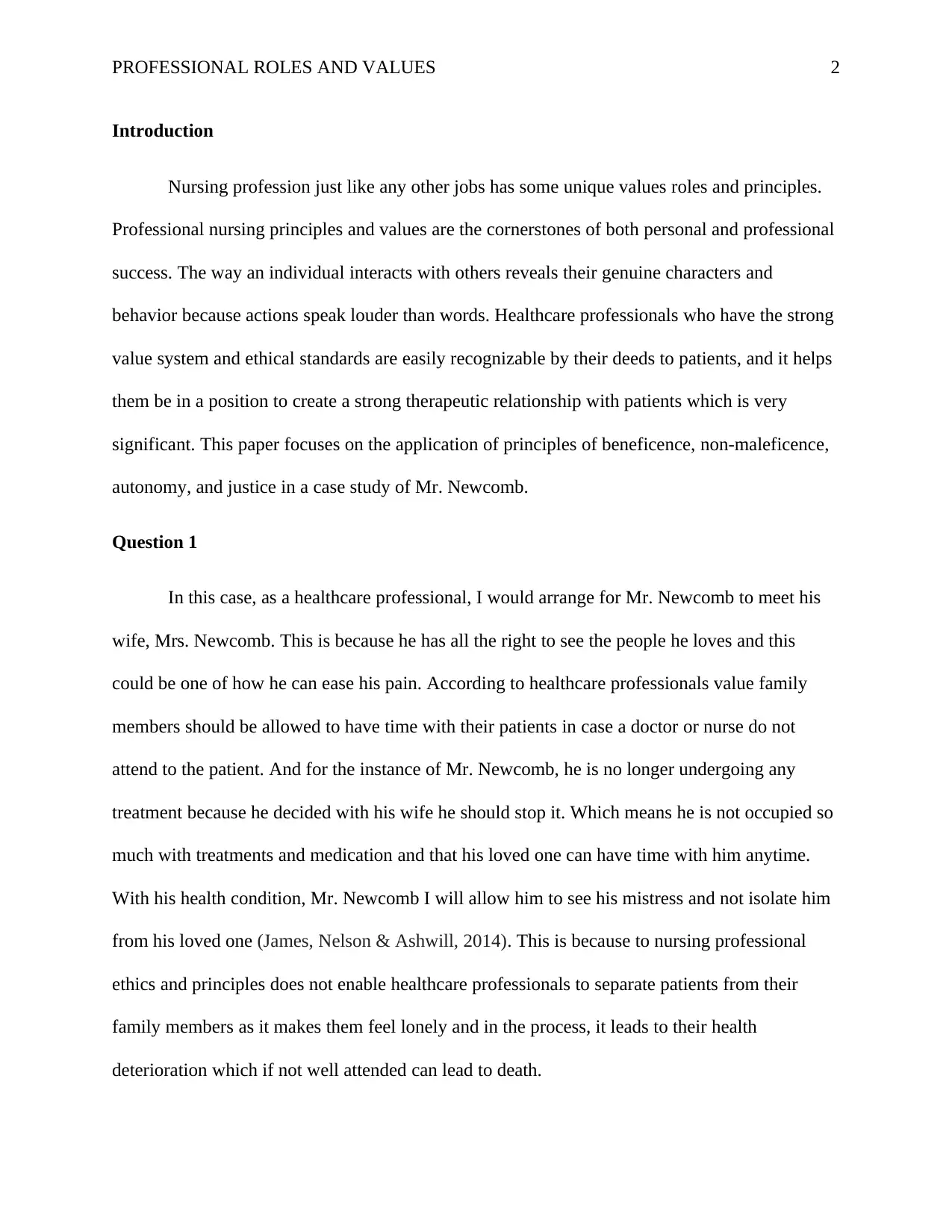
PROFESSIONAL ROLES AND VALUES 2
Introduction
Nursing profession just like any other jobs has some unique values roles and principles.
Professional nursing principles and values are the cornerstones of both personal and professional
success. The way an individual interacts with others reveals their genuine characters and
behavior because actions speak louder than words. Healthcare professionals who have the strong
value system and ethical standards are easily recognizable by their deeds to patients, and it helps
them be in a position to create a strong therapeutic relationship with patients which is very
significant. This paper focuses on the application of principles of beneficence, non-maleficence,
autonomy, and justice in a case study of Mr. Newcomb.
Question 1
In this case, as a healthcare professional, I would arrange for Mr. Newcomb to meet his
wife, Mrs. Newcomb. This is because he has all the right to see the people he loves and this
could be one of how he can ease his pain. According to healthcare professionals value family
members should be allowed to have time with their patients in case a doctor or nurse do not
attend to the patient. And for the instance of Mr. Newcomb, he is no longer undergoing any
treatment because he decided with his wife he should stop it. Which means he is not occupied so
much with treatments and medication and that his loved one can have time with him anytime.
With his health condition, Mr. Newcomb I will allow him to see his mistress and not isolate him
from his loved one (James, Nelson & Ashwill, 2014). This is because to nursing professional
ethics and principles does not enable healthcare professionals to separate patients from their
family members as it makes them feel lonely and in the process, it leads to their health
deterioration which if not well attended can lead to death.
Introduction
Nursing profession just like any other jobs has some unique values roles and principles.
Professional nursing principles and values are the cornerstones of both personal and professional
success. The way an individual interacts with others reveals their genuine characters and
behavior because actions speak louder than words. Healthcare professionals who have the strong
value system and ethical standards are easily recognizable by their deeds to patients, and it helps
them be in a position to create a strong therapeutic relationship with patients which is very
significant. This paper focuses on the application of principles of beneficence, non-maleficence,
autonomy, and justice in a case study of Mr. Newcomb.
Question 1
In this case, as a healthcare professional, I would arrange for Mr. Newcomb to meet his
wife, Mrs. Newcomb. This is because he has all the right to see the people he loves and this
could be one of how he can ease his pain. According to healthcare professionals value family
members should be allowed to have time with their patients in case a doctor or nurse do not
attend to the patient. And for the instance of Mr. Newcomb, he is no longer undergoing any
treatment because he decided with his wife he should stop it. Which means he is not occupied so
much with treatments and medication and that his loved one can have time with him anytime.
With his health condition, Mr. Newcomb I will allow him to see his mistress and not isolate him
from his loved one (James, Nelson & Ashwill, 2014). This is because to nursing professional
ethics and principles does not enable healthcare professionals to separate patients from their
family members as it makes them feel lonely and in the process, it leads to their health
deterioration which if not well attended can lead to death.
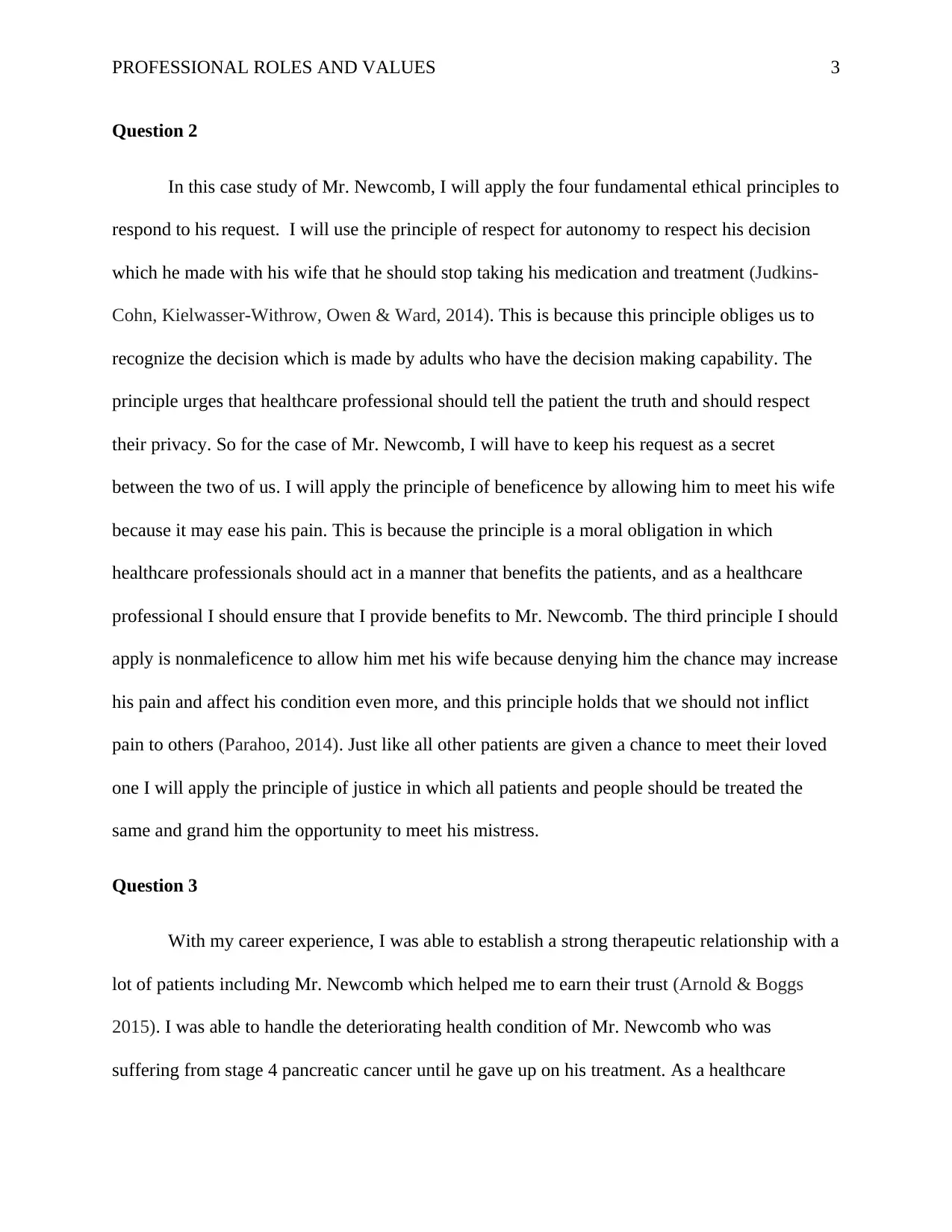
PROFESSIONAL ROLES AND VALUES 3
Question 2
In this case study of Mr. Newcomb, I will apply the four fundamental ethical principles to
respond to his request. I will use the principle of respect for autonomy to respect his decision
which he made with his wife that he should stop taking his medication and treatment (Judkins-
Cohn, Kielwasser-Withrow, Owen & Ward, 2014). This is because this principle obliges us to
recognize the decision which is made by adults who have the decision making capability. The
principle urges that healthcare professional should tell the patient the truth and should respect
their privacy. So for the case of Mr. Newcomb, I will have to keep his request as a secret
between the two of us. I will apply the principle of beneficence by allowing him to meet his wife
because it may ease his pain. This is because the principle is a moral obligation in which
healthcare professionals should act in a manner that benefits the patients, and as a healthcare
professional I should ensure that I provide benefits to Mr. Newcomb. The third principle I should
apply is nonmaleficence to allow him met his wife because denying him the chance may increase
his pain and affect his condition even more, and this principle holds that we should not inflict
pain to others (Parahoo, 2014). Just like all other patients are given a chance to meet their loved
one I will apply the principle of justice in which all patients and people should be treated the
same and grand him the opportunity to meet his mistress.
Question 3
With my career experience, I was able to establish a strong therapeutic relationship with a
lot of patients including Mr. Newcomb which helped me to earn their trust (Arnold & Boggs
2015). I was able to handle the deteriorating health condition of Mr. Newcomb who was
suffering from stage 4 pancreatic cancer until he gave up on his treatment. As a healthcare
Question 2
In this case study of Mr. Newcomb, I will apply the four fundamental ethical principles to
respond to his request. I will use the principle of respect for autonomy to respect his decision
which he made with his wife that he should stop taking his medication and treatment (Judkins-
Cohn, Kielwasser-Withrow, Owen & Ward, 2014). This is because this principle obliges us to
recognize the decision which is made by adults who have the decision making capability. The
principle urges that healthcare professional should tell the patient the truth and should respect
their privacy. So for the case of Mr. Newcomb, I will have to keep his request as a secret
between the two of us. I will apply the principle of beneficence by allowing him to meet his wife
because it may ease his pain. This is because the principle is a moral obligation in which
healthcare professionals should act in a manner that benefits the patients, and as a healthcare
professional I should ensure that I provide benefits to Mr. Newcomb. The third principle I should
apply is nonmaleficence to allow him met his wife because denying him the chance may increase
his pain and affect his condition even more, and this principle holds that we should not inflict
pain to others (Parahoo, 2014). Just like all other patients are given a chance to meet their loved
one I will apply the principle of justice in which all patients and people should be treated the
same and grand him the opportunity to meet his mistress.
Question 3
With my career experience, I was able to establish a strong therapeutic relationship with a
lot of patients including Mr. Newcomb which helped me to earn their trust (Arnold & Boggs
2015). I was able to handle the deteriorating health condition of Mr. Newcomb who was
suffering from stage 4 pancreatic cancer until he gave up on his treatment. As a healthcare
You're viewing a preview
Unlock full access by subscribing today!
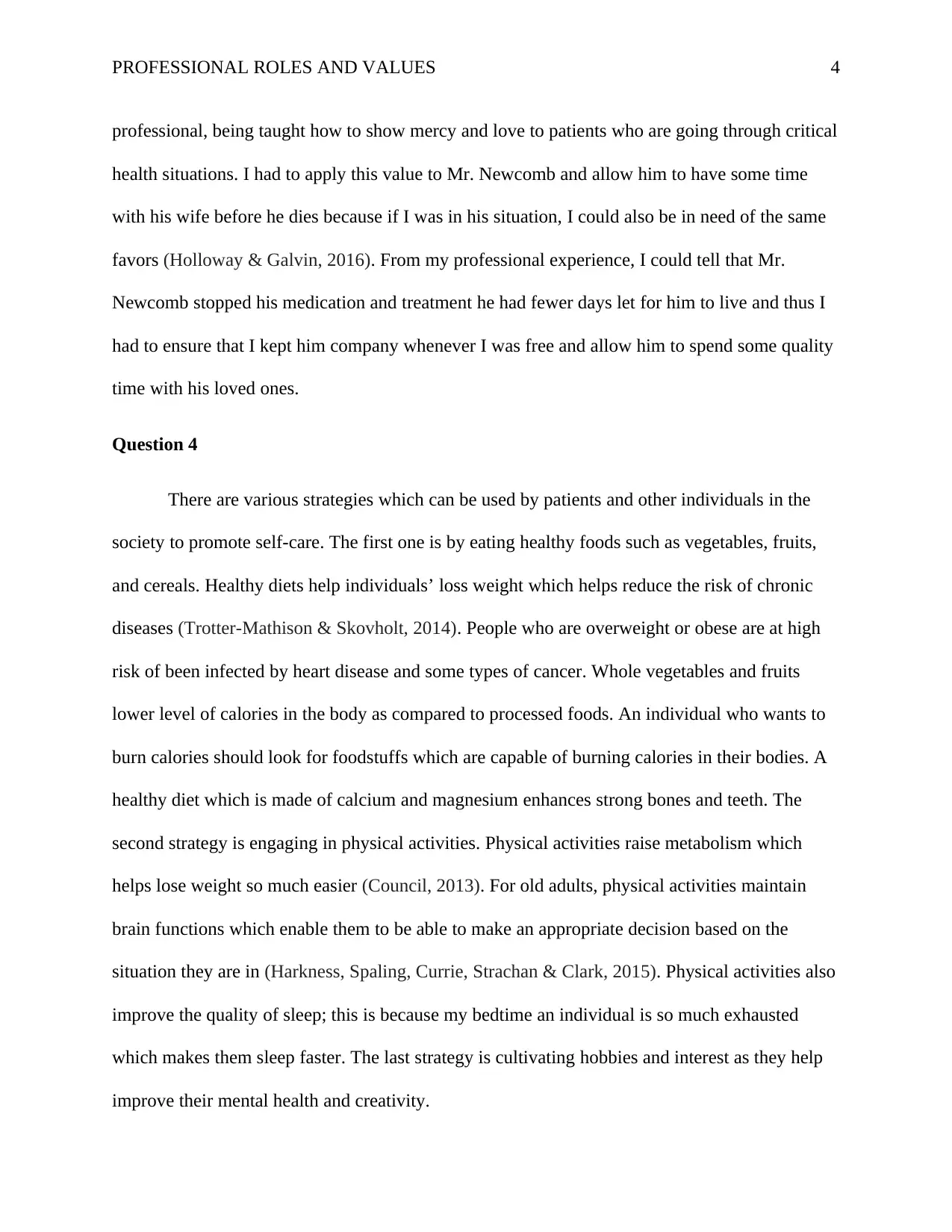
PROFESSIONAL ROLES AND VALUES 4
professional, being taught how to show mercy and love to patients who are going through critical
health situations. I had to apply this value to Mr. Newcomb and allow him to have some time
with his wife before he dies because if I was in his situation, I could also be in need of the same
favors (Holloway & Galvin, 2016). From my professional experience, I could tell that Mr.
Newcomb stopped his medication and treatment he had fewer days let for him to live and thus I
had to ensure that I kept him company whenever I was free and allow him to spend some quality
time with his loved ones.
Question 4
There are various strategies which can be used by patients and other individuals in the
society to promote self-care. The first one is by eating healthy foods such as vegetables, fruits,
and cereals. Healthy diets help individuals’ loss weight which helps reduce the risk of chronic
diseases (Trotter-Mathison & Skovholt, 2014). People who are overweight or obese are at high
risk of been infected by heart disease and some types of cancer. Whole vegetables and fruits
lower level of calories in the body as compared to processed foods. An individual who wants to
burn calories should look for foodstuffs which are capable of burning calories in their bodies. A
healthy diet which is made of calcium and magnesium enhances strong bones and teeth. The
second strategy is engaging in physical activities. Physical activities raise metabolism which
helps lose weight so much easier (Council, 2013). For old adults, physical activities maintain
brain functions which enable them to be able to make an appropriate decision based on the
situation they are in (Harkness, Spaling, Currie, Strachan & Clark, 2015). Physical activities also
improve the quality of sleep; this is because my bedtime an individual is so much exhausted
which makes them sleep faster. The last strategy is cultivating hobbies and interest as they help
improve their mental health and creativity.
professional, being taught how to show mercy and love to patients who are going through critical
health situations. I had to apply this value to Mr. Newcomb and allow him to have some time
with his wife before he dies because if I was in his situation, I could also be in need of the same
favors (Holloway & Galvin, 2016). From my professional experience, I could tell that Mr.
Newcomb stopped his medication and treatment he had fewer days let for him to live and thus I
had to ensure that I kept him company whenever I was free and allow him to spend some quality
time with his loved ones.
Question 4
There are various strategies which can be used by patients and other individuals in the
society to promote self-care. The first one is by eating healthy foods such as vegetables, fruits,
and cereals. Healthy diets help individuals’ loss weight which helps reduce the risk of chronic
diseases (Trotter-Mathison & Skovholt, 2014). People who are overweight or obese are at high
risk of been infected by heart disease and some types of cancer. Whole vegetables and fruits
lower level of calories in the body as compared to processed foods. An individual who wants to
burn calories should look for foodstuffs which are capable of burning calories in their bodies. A
healthy diet which is made of calcium and magnesium enhances strong bones and teeth. The
second strategy is engaging in physical activities. Physical activities raise metabolism which
helps lose weight so much easier (Council, 2013). For old adults, physical activities maintain
brain functions which enable them to be able to make an appropriate decision based on the
situation they are in (Harkness, Spaling, Currie, Strachan & Clark, 2015). Physical activities also
improve the quality of sleep; this is because my bedtime an individual is so much exhausted
which makes them sleep faster. The last strategy is cultivating hobbies and interest as they help
improve their mental health and creativity.
Paraphrase This Document
Need a fresh take? Get an instant paraphrase of this document with our AI Paraphraser
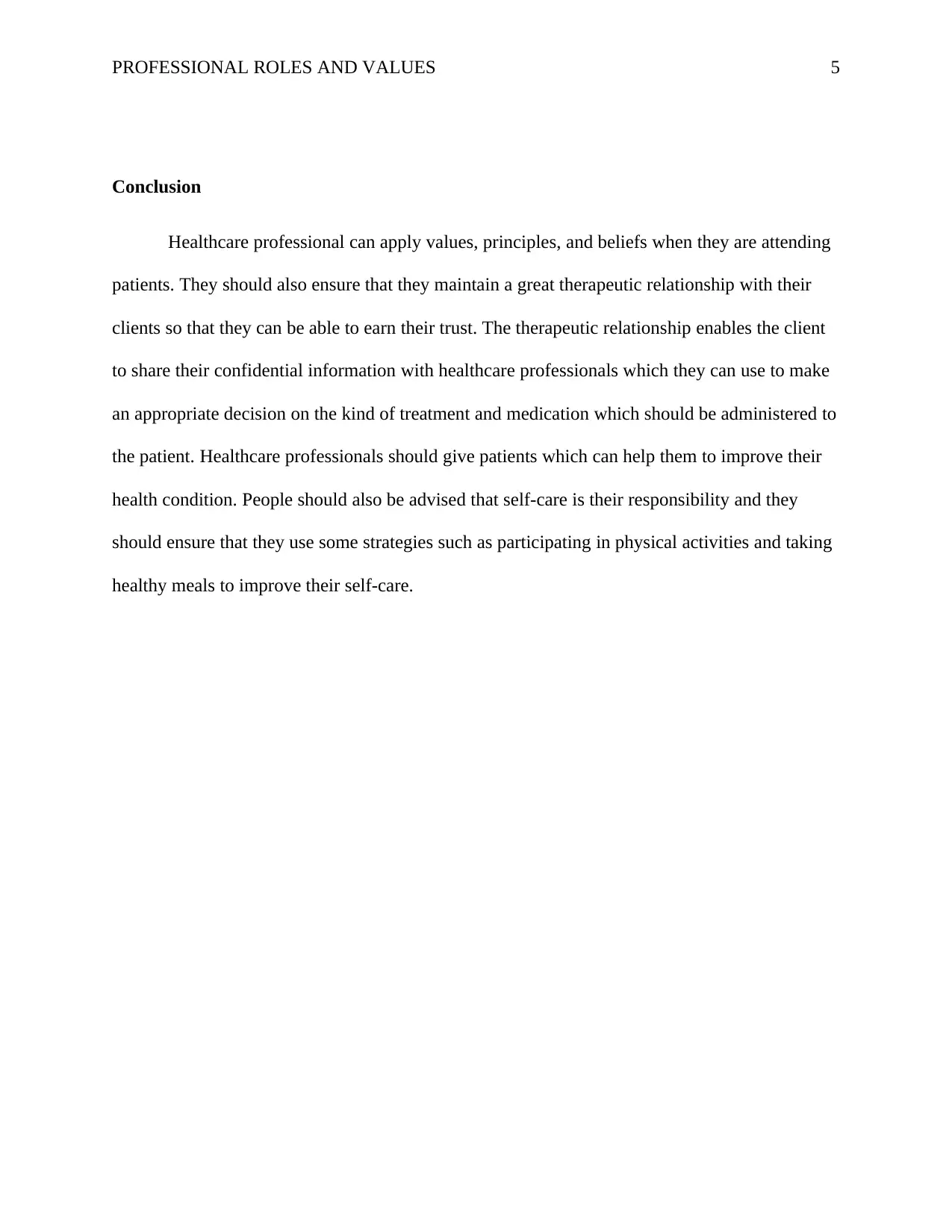
PROFESSIONAL ROLES AND VALUES 5
Conclusion
Healthcare professional can apply values, principles, and beliefs when they are attending
patients. They should also ensure that they maintain a great therapeutic relationship with their
clients so that they can be able to earn their trust. The therapeutic relationship enables the client
to share their confidential information with healthcare professionals which they can use to make
an appropriate decision on the kind of treatment and medication which should be administered to
the patient. Healthcare professionals should give patients which can help them to improve their
health condition. People should also be advised that self-care is their responsibility and they
should ensure that they use some strategies such as participating in physical activities and taking
healthy meals to improve their self-care.
Conclusion
Healthcare professional can apply values, principles, and beliefs when they are attending
patients. They should also ensure that they maintain a great therapeutic relationship with their
clients so that they can be able to earn their trust. The therapeutic relationship enables the client
to share their confidential information with healthcare professionals which they can use to make
an appropriate decision on the kind of treatment and medication which should be administered to
the patient. Healthcare professionals should give patients which can help them to improve their
health condition. People should also be advised that self-care is their responsibility and they
should ensure that they use some strategies such as participating in physical activities and taking
healthy meals to improve their self-care.
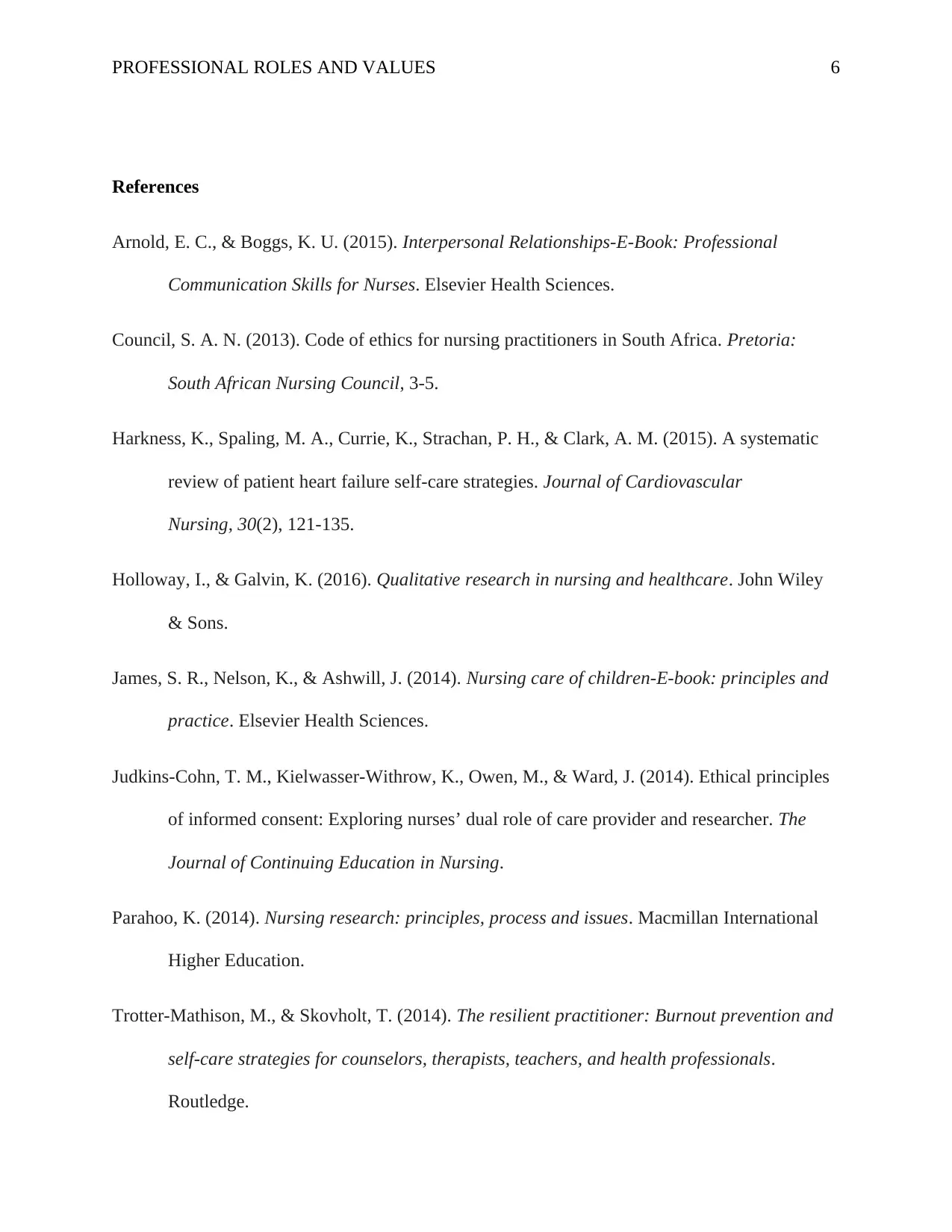
PROFESSIONAL ROLES AND VALUES 6
References
Arnold, E. C., & Boggs, K. U. (2015). Interpersonal Relationships-E-Book: Professional
Communication Skills for Nurses. Elsevier Health Sciences.
Council, S. A. N. (2013). Code of ethics for nursing practitioners in South Africa. Pretoria:
South African Nursing Council, 3-5.
Harkness, K., Spaling, M. A., Currie, K., Strachan, P. H., & Clark, A. M. (2015). A systematic
review of patient heart failure self-care strategies. Journal of Cardiovascular
Nursing, 30(2), 121-135.
Holloway, I., & Galvin, K. (2016). Qualitative research in nursing and healthcare. John Wiley
& Sons.
James, S. R., Nelson, K., & Ashwill, J. (2014). Nursing care of children-E-book: principles and
practice. Elsevier Health Sciences.
Judkins-Cohn, T. M., Kielwasser-Withrow, K., Owen, M., & Ward, J. (2014). Ethical principles
of informed consent: Exploring nurses’ dual role of care provider and researcher. The
Journal of Continuing Education in Nursing.
Parahoo, K. (2014). Nursing research: principles, process and issues. Macmillan International
Higher Education.
Trotter-Mathison, M., & Skovholt, T. (2014). The resilient practitioner: Burnout prevention and
self-care strategies for counselors, therapists, teachers, and health professionals.
Routledge.
References
Arnold, E. C., & Boggs, K. U. (2015). Interpersonal Relationships-E-Book: Professional
Communication Skills for Nurses. Elsevier Health Sciences.
Council, S. A. N. (2013). Code of ethics for nursing practitioners in South Africa. Pretoria:
South African Nursing Council, 3-5.
Harkness, K., Spaling, M. A., Currie, K., Strachan, P. H., & Clark, A. M. (2015). A systematic
review of patient heart failure self-care strategies. Journal of Cardiovascular
Nursing, 30(2), 121-135.
Holloway, I., & Galvin, K. (2016). Qualitative research in nursing and healthcare. John Wiley
& Sons.
James, S. R., Nelson, K., & Ashwill, J. (2014). Nursing care of children-E-book: principles and
practice. Elsevier Health Sciences.
Judkins-Cohn, T. M., Kielwasser-Withrow, K., Owen, M., & Ward, J. (2014). Ethical principles
of informed consent: Exploring nurses’ dual role of care provider and researcher. The
Journal of Continuing Education in Nursing.
Parahoo, K. (2014). Nursing research: principles, process and issues. Macmillan International
Higher Education.
Trotter-Mathison, M., & Skovholt, T. (2014). The resilient practitioner: Burnout prevention and
self-care strategies for counselors, therapists, teachers, and health professionals.
Routledge.
You're viewing a preview
Unlock full access by subscribing today!
1 out of 6
Related Documents
Your All-in-One AI-Powered Toolkit for Academic Success.
+13062052269
info@desklib.com
Available 24*7 on WhatsApp / Email
![[object Object]](/_next/static/media/star-bottom.7253800d.svg)
Unlock your academic potential
© 2024 | Zucol Services PVT LTD | All rights reserved.





